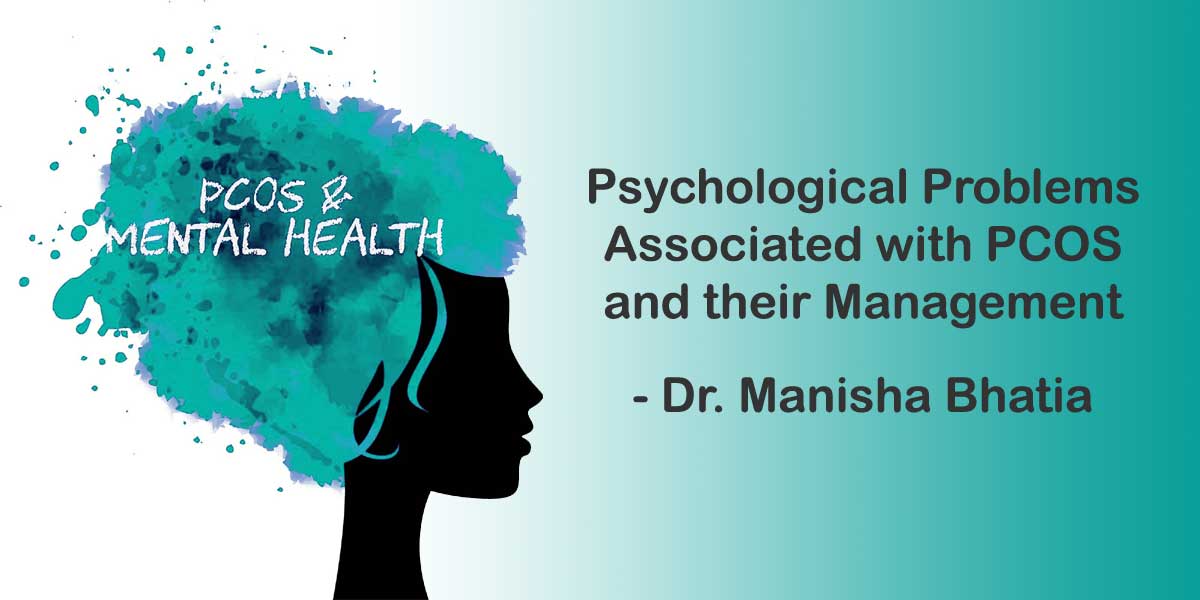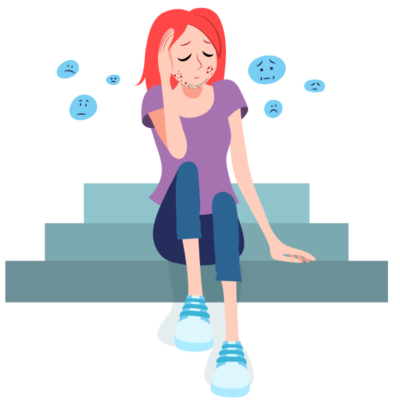What is a Polycystic Ovarian Syndrome?
PCOS is a common endocrine disorder affecting around 5-10% of women in their reproductive life. Chronic oligovulation (less eggs) or anovulation (no eggs), clinical or biochemical evidence of androgen excess and the presence of polycystic ovaries on an ultrasound are the main diagnostic criteria for PCOS.
We all know the common symptoms and manifestations of PCOS such as infertility, menstrual dysfunction, insulin resistance, acne, hirsutism and obesity, but we pay less attention to the psychological problems associated with PCOS.
Read: Homeopathy Treatment for PCOS
PCOS and Impaired Mental Health
Females suffering with PCOS have to face social stigmatization due to their appearance, looks and reproductive incapability. Infertility, obesity, acne and hirsutism are such factors that can produce undesirable stress on a female suffering with PCOS and leads to lower self esteem and poor quality of life.
Prevalence of depression and anxiety in women with PCOS is 29 -50% and 57% respectively.[i]
What is mental health?
When we talk about health it includes well being of a person at physical, mental and emotional and social levels.
Mental health is a state of psychological and emotional wellbeing so that a person can cope with the normal stresses and lead productive and fruitful life.
That is why Schipper introduced a term Quality of Life (qol) and Health Related Quality of Life (hrqol), being assessed only from the perspective of the patient.
But the question is can PCOS affect your mood?
It is found that PCOS significantly reduces the quality of life. The study by Coffey et al. has shown that women with PCOS have a 20% lower quality of life than patients with asthma, diabetes mellitus, and epilepsy.
Uncertainty of any curative and effective treatment and accompanying challenges to cope with the manifestations, contributes to poor quality of life.
Common psychological diseases associate with PCOS.
Bipolar disorder
Eating disorders
Anxiety and fears
Decreased self esteem and body dissatisfaction.
Depression
Depression is not just sadness, it is more serious than that. In depression, there is a persistent feeling of sadness, hopelessness, worthlessness and that affects his or her capacity to perform the routine tasks. In a study it was found that depression is 40% more common in females with PCOS than without PCOS.[ii]
Why does PCOS cause depression?
The exact association of PCOS with depression is not known but there are many contributing factors. Nearly 70% patients with PCOS have insulin resistance, which in turn is known to have strong association with depression. Obesity and excessive body hair can lead to negative body image and social consciousness, leading to social anxiety and depression.
The patients are often unaware of the fact that they are clinically depressed. They usually complain of just feeling low, lack of interest in work, low energy, feeling blue, no desire to socialize etc. If you feel you have depression, you can screen yourself with this online depression test, before speaking to your physician.
Bipolar disorders
Bipolar disorders are characterized with episodes of mood swings ranging from very low depression to high mania. Mood swings in PCOS are common. Excess of androgens can contribute to it. One study has shown that PCOS is sometimes caused by the Valproic acid which is used to treat bipolar disorders and some explains that this condition and PCOS both have common link at hypothalamo-pitutary axis.
Eating disorders
There are three main types of Eating disorders : Anorexia nervosa (self starvation and obsession about weight), Bulimia ( having large amount of food in a short amount of time followed by purging) and Binge eating disorder(BED). Studies show higher prevalence of eating disorders in women with PCOS. [iii], [iv]
Anxiety and Fear
Most women are afraid of infertility, negative body image, hirsutism, obesity and more over, lack of social acceptability. Chronic fears give rise to anxiety and apprehensions.
One study found that higher anxiety scores were indicated in PCOS women with hirsutism than in women with newly diagnoses gynecological cancer. [v]
Management of Psychological Stress Related To PCOS
Gynecologists or sometimes General physicians are the first line professionals to diagnose the PCOS. It is very necessary for them to pay attention to the mood and anxiety related issues for every patient with PCOS.
All psychological symptoms need to be acknowledged and addressed in order to get successful outcome of treatment especially in cases of PCOS.
Counseling about the nature of disease, treatment options and treatment outcome can help reduce the stress related to the disease diagnosis.
PCOD Patients showing signs of stress, depress and anxiety may need professional psychological counseling and support to deal with stress related to body-shaming, negative body image or stress related to incurability or stigma related to infertility.
Homeopathy for Treating Depression and Axiety Related to PCOS
 When we talk about Homeopathy and the approach of homeopathic medicine in PCOS treatment, it is entirely focused on making the body healthy on each plane, be it is physical or mental. Homeopathy takes every patient as a unique individual, though suffering with the same disease but having slightly or remarkably different presentation on physical, mental and emotional plane.
When we talk about Homeopathy and the approach of homeopathic medicine in PCOS treatment, it is entirely focused on making the body healthy on each plane, be it is physical or mental. Homeopathy takes every patient as a unique individual, though suffering with the same disease but having slightly or remarkably different presentation on physical, mental and emotional plane.
As we know that PCOD is a condition involving imbalance of hormones at various level, relating it merely with menstrual irregularity and presence of cysts in ovaries may be a big mistake. It also affects other metabolic functions and may results in diabetes and obesity.
Conventional medicine has a simple rule of a particular drug to address a particular problem at chemical or physiological level. It means you have to take one medicine to correct your periods, one to address your diabetes, other for acne and hisutism and so on.
Still patients will not get permanent solution to their problem.
In Homeopathy, along with all physiologic disturbances, we try to understand the root cause of the problem, which may be present at the genetic plane or at emotional or psychological plane. We also precisely note the responses of an individual after that disturbance.
By doing so we actually get the complete picture of an individual with a disease. Now we select the specific homeopathic medicine that showed exactly similar symptoms while drug-proving.
Most of the homeopathic medicines have an associated psychological profile. While treating PCOD, we try to give a remedy that not only covers the menstrual irregularity but also the psychological profile of the patient.
A person with PCOD with anorexia will get a different homeopathic medicine from a person with same disease but having bulimia; a person with polycystic ovarian syndrome who is very anxious about her appearance will get a different medicine and a person who is not bothered about her looks will get a different one. Within each group there is finer individualization and out of the hundreds of possible homeopathic remedies for PCOS, a remedy is careful selected for each individual, taking care of the holistic well-being of the patient.
What the patients can do for improving their mental health
Relaxation, meditation and yoga or any other exercise improves person’s strength, give endurance and improves mood and quality of life. Patient’s should try to incorporate healthy diet and regular exercise in their lifestyle. These not only help in treating PCOS but also reduce the risk of associated psychological morbidity.
[i]https://www.researchgate.net/publication/312870801_Increased_Risk_of_Psychiatric_Disorders_in_Women_with_Polycystic_Ovary_Syndrome_in_Southwest_China
[ii] https://www.ncbi.nlm.nih.gov/pmc/articles/PMC5998697/
[iii] https://www.ncbi.nlm.nih.gov/pubmed/27244869
[iv] https://www.ncbi.nlm.nih.gov/pmc/articles/PMC6529622/
[v] https://www.researchgate.net/publication/221925726_Psycho-Social_and_Sexual_Well-Being_in_Women_with_Polycystic_Ovary_Syndrome



